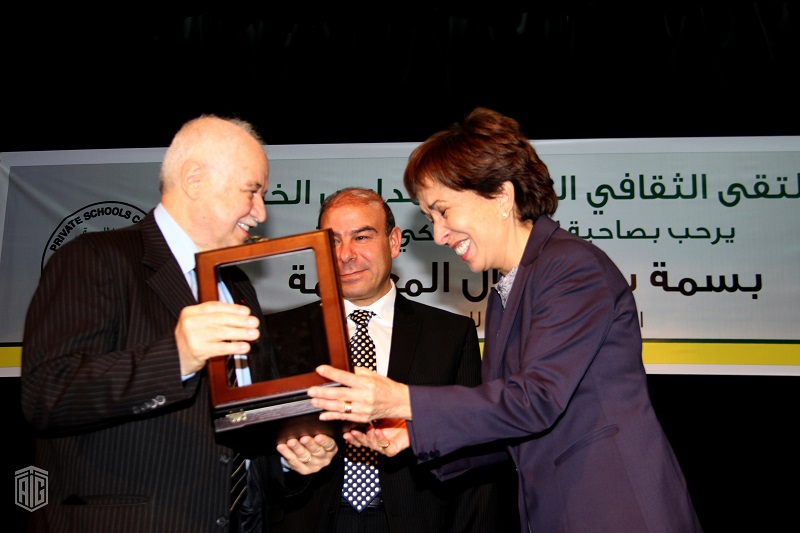HRH Princess Basma Inaugurates the Private Schools Cultural and Educational Forum
05 Nov 2013 Abu-Ghazaleh: We need digital revolution and genuine change in educational systemAMMAN--------November 5, 2013--------Under the Patronage of HRH Princess Basma bint Talal, the 22nd Private Schools Cultural and Educational Forum was held at the Islamic Educational College under the theme “Leading Change in the School: Why and How?”
The Forum aims at contributing to the educational process in Jordan, forging closer ties between the private schools on one hand and local, Arab and international communities on the other, in addition to raising the level of professional performance of teachers and technical and administrative staff.

In her speech, HRH Princess Basma stated that since its inception, Jordan believed and continues to believe in members of the community’s right to education; it has been successful in building educational institutions that have prepared graduates for real jobs and helped them acquire capabilities and competence; thus, they have contributed to founding the pillars of the state, and their expertise has benefited our Arab neighbours as well.
The Princess said "Development requires believing in the power of knowledge to solve our problems and opting for dialogue as a means to overcome our differences. As we start to encounter the challenges of the education system, countries of the world enter a tough race to develop their own potential and available resources to have their share of opportunities offered by the new global economic growth," she added.
HRH indicated that schools are not ivory towers or institutions that were disconnected from each other, but rather lighthouses that carry signs of change for a society and promise of a better future, stressing that decades ago, the Jordanian school was a pioneer of change in its local and surrounding communities, and is still able to be so today.
HRH touched upon the crisis and challenges that we are facing, that lie in our weak ability to employ technology to serve the goals of learning and in the transformation of our schools into yards governed by sectarian groups, emergence of forms of school bullying, the schools’ loss of their qualities of attraction and confidence and the emergence of new forms of violence.
Meanwhile, HE Dr. Abu-Ghazaleh stressed that the Internet achieved the universal democracy that many countries of the world have failed to deliver. He said that we needed a knowledge revival, pointing out that those who will rule the world of today and tomorrow are knowledge workers.
Dr. Abu-Ghazaleh criticized the lack of official recognition of digital education and dependence on traditional teaching to date, calling for a knowledge revolution and genuine change in the education system, and warning that if this does not happen we will be out of date.
Therefore, says Abu-Ghazaleh, "We have established a global university through which we achieve the democracy of accredited and internationally recognized learning. The Talal Abu-Ghazaleh University (TAGI-UNI) provides all people with the opportunity of obtaining a degree from one of the world universities while staying in their country.
Abu-Ghazaleh also criticized the emergence of a new sort of language circulating among the young called Arabeezi [Arabenglish), calling for facing up to this phenomenon before it becomes widespread, weakens our language and impacts on education and society. He announced the launch of the Arabic Electronic Encyclopaedia (TAGEPEDIA) which has exceeded the global Wikipedia in terms of the volume and accuracy of its information. TAGEPEDIA is one of the initiatives and achievements of Talal Abu-Ghazaleh Organization. We are hoping that through this initiative that Arabic language can achieve the fifth rank in the world on the Internet instead of the current 28th position.
Dr. Abu-Ghazaleh called for the transition to smart schools and smart portfolios and for the teacher to become a technical leader to teach students searching for and developing information, arguing that this is a revolution that we need to keep up with and move from teaching to learning.
In this regard, Dr. Abu-Ghazaleh said that Talal Abu-Ghazaleh Organization has issued in cooperation with the United Nations Educational, Scientific and Cultural Organization (UNESCO) a report on the use of information technology in teaching that included Jordan and other Arab countries. Based on that report, work is under way to cover the incomplete aspects and support the trends included in the report.
Moreover, Abu-Ghazaleh argues that we need several revolutions in the field of education, including the abolition of university walls so as to transform universities into academic institutions, not real estate ones, and allocating budgets for spending on programs, research and teaching rather than on buildings, followed by abolishing university campuses to transition to smart schools.
Meanwhile, Mr. Omar Tayeh, head of the Forum, argued that change is a necessary requirement in the light of the great technological development in the world, pointing out that Arabs’ contributions to this development are almost equal to nothing.
For her part, Dr. Jumanah Abu Hejleh, Director-General of the Islamic Educational College, explained that the School has consistently supported education programs and initiatives that seek development and change in our education system. The School assumes a number of responsibilities, including spreading the culture of change and sustainable knowledge.
The angles of the conference focus on excellence in education, violence in schools, children’s literature to develop their creative skills, curricula and appropriate practices. The Forum also included a specialized exhibition.
HRH Princess Basma presented the shield of the Conference and Forum to HE Dr. Abu-Ghazaleh in recognition of his role, efforts and belief in the importance of the development of education.





